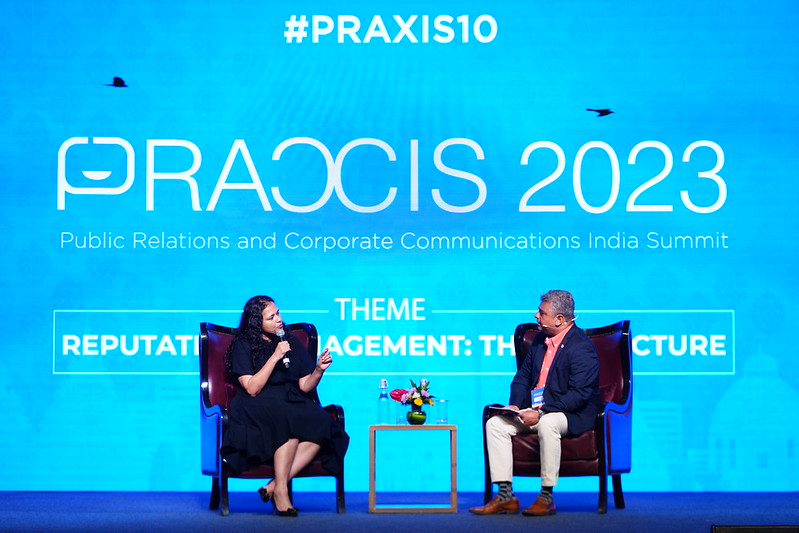In today’s ever-evolving marketplace, where consumers are bombarded with countless choices, on thing is loud and clear – brand trust is today, an invaluable currency for businesses. The ability to establish and maintain trust is not only a testament to a brand’s credibility but also its ability to weather any storm, especially when reputation takes a hit. Prabha Narasimhan, Managing Director & CEO of Colgate-Palmolive India Limited, emphasized the pivotal role of building brand trust in her recent keynote address – “Building Brand Trust”, by shedding light on the profound significance of trust in the world of business.
Most significantly, Brand Trust is multifaceted, encompassing a commitment to understanding one’s target audience, consistent and truthful messaging, accountability and authenticity. The establishment of brand trust is fundamental to the very existence of a brand, for many important reasons: it provides the resilience to overcome adversity, empowers the audience to offer honest feedback, and allows for risk-taking in the future.
The Essence of Brand ‘TRUST’
Prabha Narasimhan kicked off her keynote by highlighting the significance of brand ‘TRUST’ with a powerful example from Colgate. The Colgate Strong Teeth Toothless Granny TVC exemplified how trust in a brand can become a powerful narrative in itself. The commercial showcased a strong and resilient grandmother who relies on Colgate for her oral health, underlining the idea that trust in a brand goes beyond mere product usage—it becomes a part of people’s lives.
In today’s context, building trust is more critical than ever. It not only strengthens the connection between a brand and its audience but also unlocks several advantages along the way. These benefits include increased information sharing, higher levels of consumer skepticism, greater freedom of choice, more profound judgments, navigating a volatile, uncertain, complex, and ambiguous (VUCA) world, and a growing desire for trustworthiness.
The Most Trusted FMCG Brands
In the landscape of brand trust, certain names stand out as beacons of reliability and authenticity. Prabha Narasimhan highlighted some of the most trusted FMCG brands globally, including Amul, Tata, Amazon, Dell, iPhone, and Nike. These brands have managed to win the trust of consumers by consistently delivering on their brand promises and creating a bond built on credibility.
Seven Mantras of Building Brand Trust
In her enlightening talk, Prabha Narasimhan distilled the art of building brand trust into seven core mantras:
- Stay True to Your Brand Promise: The foundation of trust is based on consistently meeting and exceeding audience expectations. Brands must strive to be reliable and dependable, delivering on their brand promise every single time.
- Stay Consistent: Consistency in branding is the cornerstone of building trust. A brand that maintains a uniform voice and message across all interactions and touchpoints creates a sense of reliability and increases consumer confidence.
- Listen to Learn: Building trust requires a two-way conversation. Brands should actively engage their audience, ask questions, and seek honest feedback. This dialogue not only fosters trust but also provides valuable insights to adapt and improve.
- Add Value: A trustworthy brand seeks to enhance the everyday lives of its customers. By delivering products or services that genuinely add value, a brand becomes an indispensable part of the consumer’s routine.
- Nurture Storytellers: Positive testimonials and reviews from satisfied customers are potent trust builders. Encourage your customers to share their positive experiences and become advocates for your brand. Their authentic stories can influence others and strengthen trust.
- Stay Transparent: Honesty, integrity, and sincerity are the bedrock of trust. Brands that transparently communicate their values, ethics, and operations instill greater trust in their customers.
- Avoid Hard Sell: In the pursuit of building trust, brands should prioritize a consumer-centric approach over aggressive sales tactics. By being patient and empathetic, brands can attract their desired audience and, over time, cultivate loyal and trusting relationships.
In a world where choices are abundant and skepticism runs high, building brand trust is not just a valuable asset—it’s a business imperative. Prabha Narasimhan’s keynote address underlines that trust is a multifaceted endeavor that requires dedication, consistency, open communication, and an unwavering commitment to delivering value. By adhering to the seven mantras of brand trust, businesses can not only earn their customers’ trust but also secure their position as trustworthy and reputable brands in the market. Trust, as Prabha Narasimhan emphasized, is the key to success in today’s dynamic business landscape.
So, her parting shot was – “We build trust by powering a billion smiles”.

In a Fireside Chat with Rajesh Mani, Ashok Leyland observed that many brands are most trusted but not penetrated. So, what should brands do? “We have brands that are used everyday. Usage translates to penetration”, was her immediate reply.
The Communications function is not seen as an integral part of brand building. What is the CEO’s part and how can Communications earn a seat at the CEO’s table? She insisted that “having a Communications person at the top table is critical”. Today expectations are getting wider, and now bailing out of crisis is a smaller part. Now it is the seamlessness between Marketing and Communications and the borders are blurring.
Can Marketing and Communications merge? There is room for both, but they’re not identical. They are equally important, was her point of view.
Today, as far social media is concerned, it has taken on big time. So, what is the best way how to handle crisis? The Communications Department becomes focal point as honesty and transparency takes centre-stage. And the Top Three Things she left us with were:
– Measurement,
– Marketing & Communications should be symbiotic and,
– The use of ‘Tech’ – how would you see it differently?
The views and opinions published here belong to the author and do not necessarily reflect the views and opinions of the publisher.






Be the first to comment on "Unraveling the Essence of Building Brand Trust for Business Success"